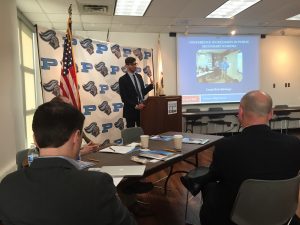Wheeling HS grad leads conference on Religion in schools
Adela Crandell Durkee — April 27, 2016
Benjamin Marcus speaks at the Conference on Religion in Public Secondary Schools at Prospect High School on April 18. (Photo by John Camardella)
Benjamin Marcus found himself in a perfect place recently as one of three people convening the Conference on Religion in Public Secondary Schools at Prospect High School on April 18.
The 2009 Wheeling High School graduate, now living in Washington D.C., joined forces with Prospect High School Teacher John Camardella, and former Prospect student, Seth Brady, who now teaches at Naperville Central High School.
Marcus is a coordinator at Covenant Partners and a Research Fellow at Religious Freedom Center of the Newseum Institute.
He is passionate about religious literacy and preventing religious violence. The Center is a nonpartisan national initiative focused on educating the American public about the religious liberty principles of the First Amendment.
Curiosity about religion and faith came almost in utero for Marcus. His mother, a Roman Catholic, and his father, a Humanist Jew, respected and celebrated the holidays of both faiths with Marcus and his older brother.
Although his parents have a very strong relationship “there was a productive tension between them,” Marcus said.
Marcus was baptized, had his first Holy Communion and had a Bar Mitzvah. Still, at some points, his parents held the line with their individual faiths. His father, explained to the 7-year-old Marcus why he didn’t leave the pew to stand with his son, as other parents did. His father wanted Marcus to understand his deep religious conviction and that not everyone is Catholic.
“Brady and Camardella are teaching about religion and doing it well,” said Marcus. “However, a number of teachers feel they are alone because there’s not a strong network of support.”
The purpose of the conference is to nurture relationships between teachers, administrators, subject matter experts, and professional associations. Part of the challenge is to nurture a strong network between all the constituencies.
The conference allowed local teachers, scholars, administrators and professional developers to share the merits and shortcomings of various ways of teaching about religion in public school, with particular emphasis on the 3Bs — Belief, Behavior, and Belonging.
Religious identity formation can be the basis for understanding religion. Marcus points out that religious identity and faith can be distinct entities.
Chad Scoggins, an English/Language Arts teacher for seven years, now teaching at Wheeling High School, teaches a class that emphasizes critical analysis of Western Literature.
“As part of this course, we read several books from both the Old and New Testaments,” he said. “We continue to study biblical themes throughout the study of other works.”
He also teaches a Multicultural Literature course. In that class students study literature and contemporary issues focused on tolerance of groups defined by demographics and beliefs.
“The 3B framework provides a framework to the study of religious beliefs and human behavior, said Scoggins.”
The conference reminded attendees of the evolving nature of the belief systems of populations. For Scoggins, the conference provided “the frame for teaching about religion and helped provide the language necessary to distinguish ethical and unethical practices and makes conversations with students, school, staff, parents, and community members more easily defined when discussion religion in public schools.”
Marcus works with teachers, state departments, and universities on religious literacy programs. He believes high school teachers are underappreciated.
“The role high school teachers have in shaping future adults and how they see the world and themselves is extremely important,” he said.
Mr. Michael Burke’s American Literature class, at Wheeling High School had a profound influence on Marcus when he was a teenager. He considers Burke as one of best teachers he’s ever had.
“Mr. Burke encouraged us to do individual art that spoke to us and deepened our understanding of the literature,” Marcus said. “His methods provided a more self-directed way to explore religion.”
Although other students took it in different directions, Marcus found it was a way to understand religious and faith influences on the society.
“Students have a natural interest in learning about religion and understand it’s an important part of American life and International relations,” said Marcus. “A powerful way of exercising this curiosity is through literature, where a reader can come to empathize without necessarily agreeing with differences. This leaves the student more prepared to engage in conversations about, rather than suppressing conversations.”
This leads to a richer understanding of diversity, and, according to Marcus, “learning about world views will help us understand our own world view.”
Approximately 40 people from the greater Chicago area attended the conference. Attendees represented Northwestern, University of Illinois, University of Chicago, and North Central College. At the high school level, teachers and administrators came from Cook, DuPage and Lake counties. Support by Anne Germanacos, the Germanacos Fellowship made the Conference possible. Information about Newseum and the Religious Freedom Center is available at http://www.newseuminstitute.org or on Facebook at https://www.facebook.com/Newseum. Follow Marcus on Twitter https://twitter.com/bpmarcus and on Facebook.



